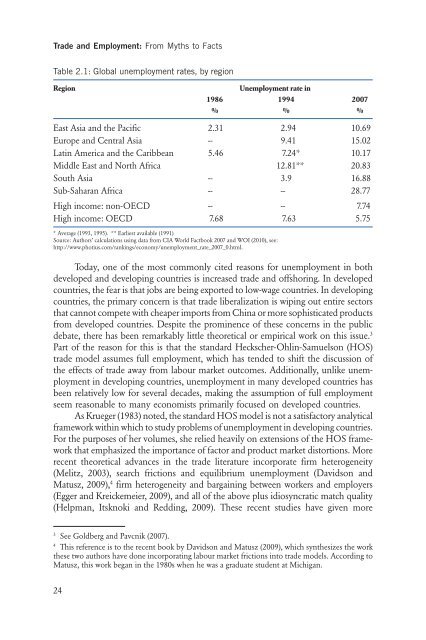Trade and Employment From Myths to Facts - International Labour ...
Trade and Employment From Myths to Facts - International Labour ...
Trade and Employment From Myths to Facts - International Labour ...
You also want an ePaper? Increase the reach of your titles
YUMPU automatically turns print PDFs into web optimized ePapers that Google loves.
<strong>Trade</strong> <strong>and</strong> <strong>Employment</strong>: <strong>From</strong> <strong>Myths</strong> <strong>to</strong> <strong>Facts</strong><br />
Table 2.1: Global unemployment rates, by region<br />
Region Unemployment rate in<br />
1986 1994 2007<br />
% % %<br />
East Asia <strong>and</strong> the Pacific 2.31 2.94 10.69<br />
Europe <strong>and</strong> Central Asia -- 9.41 15.02<br />
Latin America <strong>and</strong> the Caribbean 5.46 7.24* 10.17<br />
Middle East <strong>and</strong> North Africa 12.81** 20.83<br />
South Asia -- 3.9 16.88<br />
Sub-Saharan Africa -- -- 28.77<br />
High income: non-OECD -- -- 7.74<br />
High income: OECD 7.68 7.63 5.75<br />
* Average (1993, 1995). ** Earliest available (1991)<br />
Source: Authors’ calculations using data from CIA World Factbook 2007 <strong>and</strong> WOI (2010), see:<br />
http://www.photius.com/rankings/economy/unemployment_rate_2007_0.html.<br />
Today, one of the most commonly cited reasons for unemployment in both<br />
developed <strong>and</strong> developing countries is increased trade <strong>and</strong> offshoring. In developed<br />
countries, the fear is that jobs are being exported <strong>to</strong> low-wage countries. In developing<br />
countries, the primary concern is that trade liberalization is wiping out entire sec<strong>to</strong>rs<br />
that cannot compete with cheaper imports from China or more sophisticated products<br />
from developed countries. Despite the prominence of these concerns in the public<br />
debate, there has been remarkably little theoretical or empirical work on this issue. 3<br />
Part of the reason for this is that the st<strong>and</strong>ard Heckscher-Ohlin-Samuelson (HOS)<br />
trade model assumes full employment, which has tended <strong>to</strong> shift the discussion of<br />
the effects of trade away from labour market outcomes. Additionally, unlike unemployment<br />
in developing countries, unemployment in many developed countries has<br />
been relatively low for several decades, making the assumption of full employment<br />
seem reasonable <strong>to</strong> many economists primarily focused on developed countries.<br />
As Krueger (1983) noted, the st<strong>and</strong>ard HOS model is not a satisfac<strong>to</strong>ry analytical<br />
framework within which <strong>to</strong> study problems of unemployment in developing countries.<br />
For the purposes of her volumes, she relied heavily on extensions of the HOS framework<br />
that emphasized the importance of fac<strong>to</strong>r <strong>and</strong> product market dis<strong>to</strong>rtions. More<br />
recent theoretical advances in the trade literature incorporate firm heterogeneity<br />
(Melitz, 2003), search frictions <strong>and</strong> equilibrium unemployment (Davidson <strong>and</strong><br />
Matusz, 2009), 4 firm heterogeneity <strong>and</strong> bargaining between workers <strong>and</strong> employers<br />
(Egger <strong>and</strong> Kreickemeier, 2009), <strong>and</strong> all of the above plus idiosyncratic match quality<br />
(Helpman, Itsknoki <strong>and</strong> Redding, 2009). These recent studies have given more<br />
3 See Goldberg <strong>and</strong> Pavcnik (2007).<br />
4 This reference is <strong>to</strong> the recent book by Davidson <strong>and</strong> Matusz (2009), which synthesizes the work<br />
these two authors have done incorporating labour market frictions in<strong>to</strong> trade models. According <strong>to</strong><br />
Matusz, this work began in the 1980s when he was a graduate student at Michigan.<br />
24

















